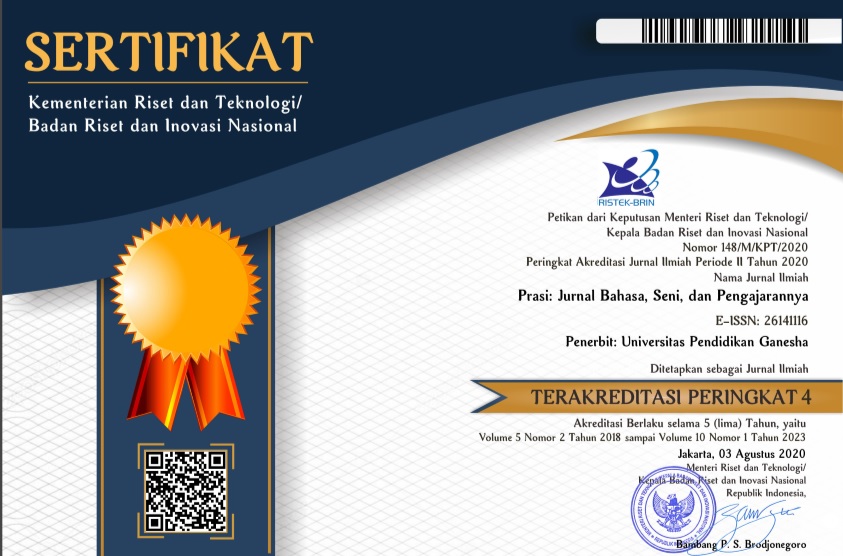IMPLIKATUR DALAM ANIME BLUE PERIOD KARYA SUTRADARA KOJI MASUNARI
DOI:
https://doi.org/10.23887/prasi.v17i02.48631Keywords:
Implikatur, prinsip kerjasama, teori cara-tujuanAbstract
This research discusses implicature in the Anime Blue Period. The purpose of the this research is to explain how the meaning and intent of implicatures in the Anime Blue Period. The research uses the theory proposed by Yule (1996) on implicature and uses is a the analysis theory means ends by Leech(1993). The research method uses is a qualitative descriptive method. The data is obtained by listening to the converversation spoken by the characters, and then the utterances containing implicatures will be recorded and marked. The result of this study found as many as 20 implicature data in the Anime Blue Period, namely 7 refuse implicature, 4 mocking implicatures, 3 commanding implicatures, 4 insinuating implicatures, and 2 invites implicatures.
Key Words: Implicature, cooperation principle, theory means-end.
Abstrak
Penelitian ini membahas tentang implikatur dalam Anime Blue Period. Tujuan penelitian ini adalah untuk menjelaskan bagaimana fungsi implikatur dalam Anime Blue Period. Penelitian ini menggunakan teori implikatur dari Yule (1996) dan menggunakan teori analisis cara-tujuan oleh Leech (1993). Metode yang digunakan adalah metode deskriptif kualitatif. Data diperoleh dengan cara menyimak percakapan yang dituturkan oleh para tokoh, kemudian peneliti mencatat dan menandai tuturan yang mengandung implikatur dalam Anime Blue Period. Hasil penelitian ditemukan 20 data implikatur dalam Anime Blue Period yaitu, tujuh implikatur menolak, empat implikatur mengejek, tiga implikatur memerintah, empat implikatur menyindir, dan dua implikatur mengajak.
Kata Kunci: Implikatur, prinsip kerjasama, teori cara-tujuan.
References
BAM, S. A., Setiawan, B., & Saddhono, K. (2018). Penggunaan bahasa indonesia pada diskusi siswa sma negeri 4 surakarta: kajian dengan prinsip kerjasama grice dan relevansinya sebagai bahan ajar keterampilan berbicara. BASASTRA, 6(1), 281–301.
Grice. H. Paul. (1975). Logic and Conversation dalam Cole et all. Syntax and Semantics Volume 3 :Speech Act. Academic Press. New York. P. 41-58.
Hapsari, P. W., Nababan, M. R., & Djatmika, D. (2016). Kajian Terjemahan Kalimat yang Merepresentasikan Tindak Tutur Asertif Menjawab dalam Dua Versi Terjemahan Novel Pride and Prejudice. PRASASTI: Journal of Linguistics, 1(1), 114–136. https://doi.org/https://doi.org/10.20961/prasasti.v1i1.1066
Kuntarto, E., & Gafar, A. (2016). Manifestasi Prinsip Kesantunan, Prinsip Kerjasama, dan Implikatur Percakapan pada Interaksi di Lingkungan Sekolah. Jurnal Ilmiah Universitas Batanghari Jambi, 16(3), 30–45. https://doi.org/http://dx.doi.org/10.33087/jiubj.v16i3.15
Levinson, Stephen C. (1983). Pragmatics. London: Cambridge Univeristy Press.
Munazar, A. (2016). Penamaan “Lum” pada Kelompok Masyarakat Dinamisme di Bangka Bagian Utara: Sebuah Tinjauan Semantik Pragmatik. Society, 4(2), 27–37. https://doi.org/https://doi.org/10.33019/society.v4i2.27
Rahardi, Kunjana. (2005). Pragmatik: Kesantunan Imperatif Bahasa Indonesia. Jakarta: Erlangga.
Rahmawati, N. (2021). Pelanggaran prinsip kerjasama dan prinsip kesantunan berbahasa percakapan dalam acara “Mata Najwa.” Diskursus: Jurnal Pendidikan Bahasa Indonesia, 4(1), 46–55.
https://doi.org/https://doi.org/10.36088/palapa.v4i2.30
Rohmadi, M. (2011). Pembelajaran Dengan Pendekatan Cep (Chemo-Entrepreneurship) Yang Bervisi SETS (Science, Environment, Technology and Society) Guna Meningkatkan Kualitas Pembelajaran. Educatio, 6(1), 17–37. https://doi.org/https://doi.org/10.29408/edc.v6i1.21
Sudaryanto. (2015). Metode dan Aneka Teknik Analisis Bahasa : Pengantar Penelitian Wahana Kebudayaan Secara Linguistis. Yogyakarta: Sanata Dharma University Press.
Sugiyono. (2017). Metode Penelitian Kualitatif. Bandung. Alfabeta.
Yule, George. (1996). Pragmatics. London: Oxford University Press.
Downloads
Published
Issue
Section
License
Copyright (c) 2022 Sumiati, Arza Aibonotika, Intan Suri

This work is licensed under a Creative Commons Attribution-NonCommercial-ShareAlike 4.0 International License.
Authors who publish with Prasi agree to the following terms:- Authors retain copyright and grant the journal the right of first publication with the work simultaneously licensed under a Creative Commons Attribution License (CC BY-SA 4.0) that allows others to share the work with an acknowledgment of the work's authorship and initial publication in this journal
- Authors are able to enter into separate, additional contractual arrangements for the non-exclusive distribution of the journal's published version of the work (e.g., post it to an institutional repository or publish it in a book), with an acknowledgment of its initial publication in this journal.
- Authors are permitted and encouraged to post their work online (e.g., in institutional repositories or on their website) prior to and during the submission process, as it can lead to productive exchanges, as well as earlier and greater citation of published work. (See The Effect of Open Access)


.png)
.png)









